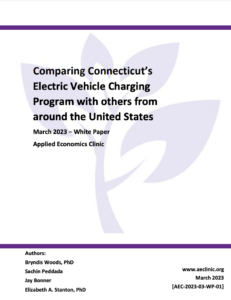Full Title: Comparing Connecticut’s Electric Vehicle Charging Program with others from around the United States
Author(s): Bryndis Woods, Sachin Peddada, Jay Bonner, and Elizabeth A. Stanton
Publisher(s): Applied Economics Clinic
Publication Date: March 17, 2023
Full Text: Download Resource
Description (excerpt):
To support Connecticut’s goal to deploy 125,000-150,000 electric vehicles (EVs) by 2025, the Connecticut Public Utilities Regulatory Authority (PURA) established a nine-year statewide EV charging program—administered by Eversource Energy and The United Illuminating Company—that aims to install nearly 65,000 EV charging ports by 2030. On behalf of the Connecticut Office of Consumer Counsel, this Applied Economics Clinic (AEC) white paper reviews EV charging programs in Connecticut and fourteen other states (California, Maine, Maryland, Massachusetts, Michigan, Minnesota, Nevada, New Jersey, New Mexico, New York, Oregon, Rhode Island, Texas, and Vermont) and compares those programs’ ability to provide net benefits to consumers based on their key characteristics.
AEC finds, among those reviewed in this white paper, Connecticut’s EV charging program is one of the most robust and is well-positioned to provide net benefits to consumers and meet the state’s EV and electric vehicle supply equipment deployment goals. Connecticut stands out as a leader due to the detailed nature of its EV and EV charging deployment goals, the inclusion of alternative rate structures to incentivize public EV charging stations, the availability of incentives to cover up to 100 percent of EV charging “make-ready” costs, and enhanced incentives for underserved communities (inclusive of low-income populations). AEC also finds, however, that Connecticut’s EV charging program could be strengthened by adopting best practices from other states’ programs, such as by setting more ambitious EV and EV charging deployment goals, working to target EV charging in as equitable a fashion as possible, and by offering ongoing incentives for EV charging.
